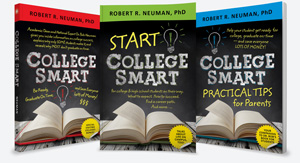For Principals
College Smart® & Career Smart® Awareness can add another dimension to your entire school
Dr. Bob can help all your students
- Dean Neuman is one of the foremost authorities in the nation in advising students. He has counseled literally thousands of students one-on-one in his 25-year career. He knows where the typical problems lie. His Strategies work together to solve them.
- He has created programs for an International Workforce Management Company. He is well-acquainted with the needs of the workplace, too.
- The College Smart® books are very different than other books about learning. These are “how-to-do-it” and “why-it’s-so-important”-books. Dr. Bob talks directly to students – very conversationally. Nothing stodgy. He explains why his 12 strategies are so crucial in SCHOOL, LIFE, and SUCCESS.
The Get College Smart® book could just as easily be called… What’s Involved in Learning? How It Leads to 21st Century Success.
Principals benefits
Your College-bound students use high school to “practice” for college courses.
Addressing the “Readiness Factor”, researchers now believe that freshman year in high school predicts a student’s success as a college freshman.
High school signals a decided shift: more independence — plus greater personal responsibility for learning and self-management as each year passes. True, middle schools begins to prepare students to “start” high school. However, students must follow-through.
Throughout the U.S., un-readiness is a major factor: in the workplace and in college.
The 12 College Smart® Strategies show students how to advance their 1) learning approaches and 2) self-management habits to succeed. Plus, The 12 Strategies make life easier and less chaotic. The Strategies also explain — play-by-play — the how, the why, and what-happens-when-you-don’t story. Students watch the dominoes fall.
FYI:
- 40% of today’s college grads can’t handle today’s white-collar work. They lack the know-how as thinkers and learners. link to bar chart.
- 66% take 6-years to graduate from college.
- 30% won’t return after freshman year.

Preparing ALL Students for what lies ahead: employment or college.
The same personal learning competencies apply.
Non-college-bounds grads go directly into the workplace. They will benefit from my learning methods and personal management skills, too. How to —
- Learn their jobs
- Organize their work
- Control their time
- Meet deadlines
- Be forward looking goal-setters who “move up.”
“We need people who can think on their feet.”
Susan Artim, Alamo, Enterprise, National Holdings Inc.,)
Your Workplace-bound students sharpen the competencies needed to land a “good” job. They’ve discovered how to become skilled learners who adapt.
As one executive put it: Degrees are less important. “I need employees who can “think on their feet.” Consider what that means. These grads enter the adult work world at a much younger age —plus, it’s a world that badly needs learners.
During a job interview, can your grads “present” themselves? Minimize the scattered teen-talk to communicate their abilities? Tell stories of their achievements in “managing school”? Explain how they completed or excelled in a complex assignment? How they stay organized and control time? How they’re able to learn new things? Not afraid to ask clarifying questions? Seek help when needed. Can work compatibly with adults? Word will spread among employers: Your school will earn a reputation for its grads.
FYI: Your students will want to aim at a “good” first job, offering them potential to “move up.”
A detailed Teacher’s Guide, The College Smart Blast, presents highly participative and interactive approaches that bring concepts to life.
How it works: The class is told that they work for the College Smart® Company’s Marketing Department. They take turns, in groups, creating skits that act as “commercials” to convince their audience to “buy” the practical value of the Strategy they’ve been assigned. Each “commercial” relates to succeeding in the real world, as well as school.
An example from the Teacher’s Guide: A group is told that a student has just been hired to be a barista at a national coffee franchise. In the early days on the job, how many ways can they think of to learn the new job? What’s involved? In their presentation, students demonstrate that learning is a life-skill, and there are many ways to go about it.
More. As groups present individual Strategies to the class, they demonstrate the real-life need for the Strategy. Students are teaching the class through presentations. But to do that, the group must generate ideas, collaborate, and problem-solve and “present-to-persuade.” The rest of the class should analyze the group’s success. “I thought it was good when Stacey….
Classroom performance improves as all your students begin “practicing” the Strategies. Two examples:
Strategy 1, How, exactly, to use your Head (Directions Included), introduces two fundamental concepts. The first? Students misunderstand what learning is. It’s not temporarily “storing things in a container.” Instead, their minds are like 21st century computers, “constantly processing and connecting pieces of information — merging them with already-known concepts.”
Another Strategy? Learning How to Talk — it’s more than running up a phone bill. Classrooms become “practice fields” for talking/listening —essential life skills — gaining confidence to participate with others. These are essentials for success. And the classroom is the place to “train”: to organize thoughts, explain, describe, listen, and exchange ideas. In the work-world, it’s called collaboration.
Counselors/Advisors use the College Smart® Strategies as springboards for highly relevant conversations with students while increasing efficiency.
Students pre-read a Strategy for the conference. Then counselor and student use their time together to focus on applying the Strategy, not explaining it. The Strategies help students recognize — some for the first time — “ways” to study, organize their work, themselves, and their time. All students are developing approaches to learning.
College-Bound Families can save an added 50% in college costs.
Host 4 fully-prepared Pre-College Awareness Nights.
College is a different world. Parents will learn the common causes of — and how to avoid — the debt of a 6-year degree. This information applies to all college-bound students, even those with excellent high school grades.
This is critical information families should know before their child “goes.” Consider these Graduation rates. It’s the result of what Higher Education calls “Un-readiness.” Invite parents to these programs to learn about Readiness.
Public colleges: Only 33% graduate in 4 years.
Private colleges: only 53% graduate in 4 years.
80% of students feel “overwhelmed.”
50% rate their mental health below-average or poor.
All the Strategies are shown as relevant: They connect to achieving Personal and Workplace Success.
40% of today’s college grads can’t handle today’s white-collar work. They aren’t equipped as thinkers and learners.
66% take 6-years to graduate from college.
30% won’t return after freshman year.
Remember the Think on Their Feet comment?
The College Smart® Strategies are the solutions. They explain how all this typically happens. And —more importantly — and how to prevent these problems. On their own for the first time, students don’t see the Big Picture


